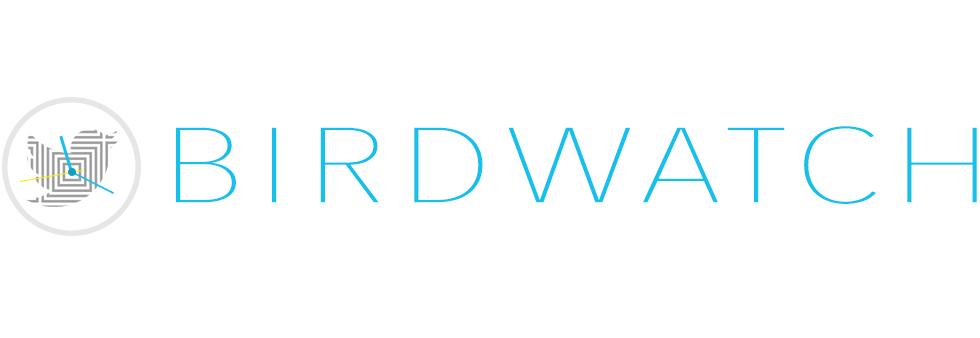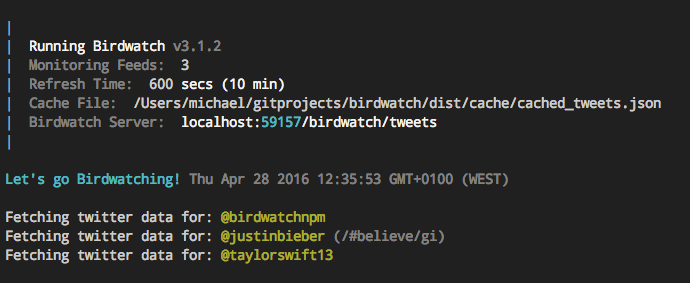
Birdwatch helps you fetch, filter, sort, cache and serve specific tweets from specific twitter accounts, thus avoiding any request limits set by the Twitter API, and giving you more control over the data that is served to your applications or websites. Use the built-in server to get you up and running quickly, or switch the server off and use the cache file anyway you like.
If you find any bugs, or have suggestions please report them. If you want to help, pull requests are always appreciated!
Installation
Step 1: Install the package via npm
$ npm install --save birdwatch
Step 2: Add your Twitter App Credentials via environment variables
There are a number of ways to set environment variables in your app, some depend on your operating system. I use dotenv, but you can use the command line, a makefile or npm. No matter what method you choose, your environment variables should have the following names:
CONSUMER_KEY: Your Twitter Consumer KeyCONSUMER_SECRET: Your Twitter Consumer SecretACCESS_TOKEN: Your Twitter Access TokenACCESS_TOKEN_SECRET: Your Twitter Access Token Secret
Now you're ready to birdwatch! :bowtie:
Usage
var Birdwatch = ; start ;By default, Birdwatch will launch a server on port 8417 for you, but you can change the port number using the port option. After running the code above, you can access your tweets at the default location:
http://localhost:8417/birdwatch/tweets
Cached HTML Tweet
If birdwatch can't find an html string on the returned tweet data, (which is sometimes the default from the Twitter API), then one will be rebuilt and added for you via tweet-patch. This means that plaintext hashtags, user-mentions and hyperlinks are converted back into twitter-ready html for you (you're welcome). 😍
const tweet = cached_tweets0; tweettext;//=> "This is the #plaintext tweet" tweethtml;//=> "This is the <a href="https://twitter.com/hashtag/plaintext">#plaintext</a> tweet"Built-in Server
Birdwatch comes equipped with its own built-in server. You don't have to configure the server at all, it will launch just fine using the defaults, but in case you need more control, you can configure the server by the following:
- Turning it on or off using the
server: <true|false>option - Overriding the url to the Birdwatch cache with the
cacheDir: <path>option - Specifying the port you want the server to run on with the
port: <portnumber>option - Optionally serving test data in a JSON format using the
testData: <json>option
Tip: The cache file is created even if the server is turned off, this means you can use Birdwatch with your own caching server: just turn the Birdwatch server off, and use the cache file however you want.
Note: As of v4.0.4, birdwatch sets defaults for CORS middleware, to see the default settings, see the source code. In the future, you will be able to customize these settings PR's welcome!.
API
Birdwatch([options])
options
Type: object
Options set here will override the defaults in the constructor.
logReports
Type: boolean
Default: true
Pretty-print birdwatch activity to the console.
refreshTime
Type: Number
Default: 600
The number of seconds to wait before the cache updates again. The default is 10 minutes (600 seconds)
Tip: Update your cache frequently, but not frequently enough to hit any Twitter API Rate Limits.
tweetPatchOptions
Type: object
Default: {stripTrailingUrl: true, hrefProps: 'target="_blank"'}
The tweet-patch options you want to pass to Birdwatch. This will affect how
the final html property on the returned/cached tweets will be processed. By default, Birdwatch removes the trailing url that
Twitter adds to the end of the text property when media was attached to the tweet. Since the media url can't render in a
text-based tweet, Birdwatch removes the unneeded trailing url.
server
Type: boolean
Default: true
Boolean to turn the server off or on. Turn the server off if you want to run your own server. Your own server can do whatever it wants with the cache file in birdwatch/dist/cache/
port
Type: number
Default: 8417
Assign a port to the Birdwatch server. If you set a port of 0 the server will assign an open port for you, and you can
get the port number with the logReport: true setting or using birdwatch.options.port. Note that setting the port to 0 (zero)
will assign any open port.
url
Type: string
Default: /birdwatch/tweets
The url you want to use to access the cached tweets. Requires the server to be running.
cacheDir
Type: string
Default: ${__dirname}/cache/
Override the location of the cache file. Make sure you have appropriate read/write permissions on this directory.
testData
Type: json
Serve tweet data in JSON format to birdwatch. Useful for testing/debugging without making network requests.
sortBy
Type: function
Default: tweet => { return new Date(tweet.created_at) * -1; }
Override the custom sorting function. Birdwatch defaults sorting to chronological order.
balancedScreennames
Type: boolean
Default: false
If this is set to true then a special sorting of the tweets will occur, which will balance the
tweets by the unique screen_name values. This will spread the usernames apart evenly so that the
distribution of tweets seems balanced. For example, suppose you have tweets authored by three people,
and they are returned from the Twitter API in this order:
USER01
USER01
USER02
USER02
USER03
USER03
setting this option to true will shuffle the tweets in a balanced order:
USER01
USER02
USER03
USER01
USER02
USER03
⚠️ Important to note that this option can NOT be used in combination with the sortBy option.
birdwatch.feed(screenname, [options])
Add a twitter feed.
screenname
Required
Type: string
The screenname of the twitter account you want to watch.
options
Type: object
Feed options.
filterTags
Type: Regex|Array
The regular expression containing the tags you want to filter with, or an array of strings. For example, all of these examples will result in the same filter:
Tip: If you need help writing your regular expressions, try regexpal.com
limit
Type: number
Default: 12
Set a limit on how many tweets you want to cache from the feed. If you are watching three feeds with a limit of 10, you will have a cache of 30 tweets.
removeRetweets
Type: boolean
Default: false
Use this if you want to remove retweets from the feed you are watching.
birdwatch.feedsFromList(listName, listOwner)
Automatically process feeds from individual members from a Twitter list
listName
Required
Type: string
The name of the list you want to extract members from
listOwner
Required
Type: string
The owner's screenname of the Twitter list you want to extract members from
Example
settings start ;birdwatch.start()
Start the Birdwatch process.
License
MIT @ Michael Wuergler
